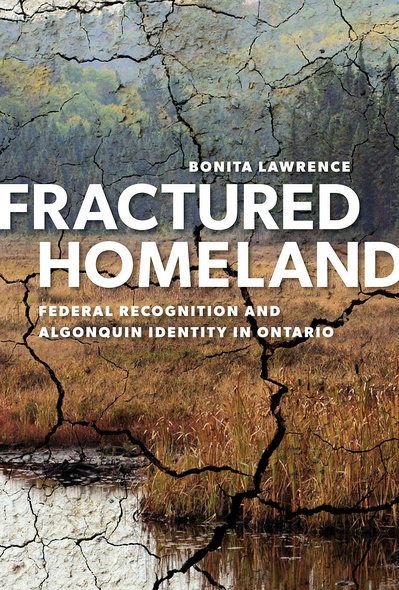
Fractured Homeland
Federal Recognition and Algonquin Identity in Ontario
In 1992, the Algonquins of Pikwakanagan, the only federally recognized Algonquin reserve in Ontario, launched a comprehensive land claim. The claim drew attention to the reality that two-thirds of Algonquins in Canada have never been recognized as Indian, and have therefore had to struggle to reassert jurisdiction over their traditional lands.
Fractured Homeland is Bonita Lawrence’s stirring account of the Algonquins’ twenty-year struggle for identity and nationhood despite the imposition of a provincial boundary that divided them across two provinces, and the Indian Act, which denied federal recognition to two-thirds of Algonquins. Drawing on interviews with Algonquins across the Ottawa River watershed, Lawrence voices the concerns of federally unrecognized Algonquins in Ontario, whose ancestors survived land theft and the denial of their rights as Algonquins, and whose family histories are reflected in the land. The land claim not only forced many of these people to struggle with questions of identity, it also heightened divisions as those who launched the claim failed to develop a more inclusive vision of Algonquinness.
This path-breaking exploration of how a comprehensive claims process can fracture the search for nationhood among First Nations also reveals how federally unrecognized Algonquin managed to hold onto a distinct sense of identity, despite centuries of disruption by settlers and the state.
This book will appeal to students and scholars in indigenous studies, sociology, history, and politics.
Awards
- 2013, Shortlisted - Canada Prize in the Social Sciences, Canadian Federation for the Humanities and Social Sciences
A good case study of a people that have been too rarely discussed and too often misunderstood. Recommended.
Fractured Homeland offers an excellent account of how Algonquin nationhood has transformed over the past two centuries. Bonita Lawrence articulates contemporary and diverse expressions of ‘Algonquinness’ through stories of identity and nationhood against the backdrop of the Algonquin comprehensive land claim. This book will make significant contributions to related areas in Indigenous legal and political studies, identity politics, nation building, and community development.
This book highlights the challenges of rebuilding the Algonquin nation. It addresses the fragmentation and conflict that are the consequence of a colonial legacy and ongoing land claim while showing that a distinct non-status Algonquin identity is alive and well in Ontario. This is an important book and I recommend it to students, specialists, and non-specialists alike.
Bonita Lawrence (Mi’kmaw) teaches Indigenous studies at York University. She is the author of “Real” Indians and Others: Mixed-Blood Urban Native People and Indigenous Nationhood (2004).
Preface
Introduction
Abbreviations and Definitions Relating to the Land Claim
Part 1: Algonquin Survival and Resurgence in the Ottawa River Watershed
1 Algonquin Diplomacy, Resistance, and Dispossession
2 The Fracturing of the Algonquin Homeland
3 Aboriginal Title and the Comprehensive Claims Process
4 The Algonquin Land Claim
5 Reclaiming Algonquin Identity
Part 2: Algonquin Communities in the Mississippi, Rideau, and Lower Madawaska River Watersheds6 The Development of Ardoch Algonquin First Nation
7 The Effect of the Land Claim in the Region
8 Uranium Resistance: Defending the Land
Part 3: Algonquin Communities in the Watershed of the Bonnechere and Petawawa Rivers
9 The Bonnechere Algonquin Communities and Greater Golden Lake
10 Perspectives from Pikwakanagan
Part 4: Algonquin Communities in the Upper Madawaska and York River Watersheds
11 The Upper Madawaska River Communities: Whitney, Madewaska, and Sabine
12 The People of Kijicho Manitou: Baptiste Lake and Bancroft
Part 5: From Mattawa to Ottawa – Algonquin Communities Along the Kichi Sibi
13 Algonquin Communities along the Ottawa River
Part 6: Conclusion
14 Algonquin Identity and Nationhood
Notes
Bibliography
Index







